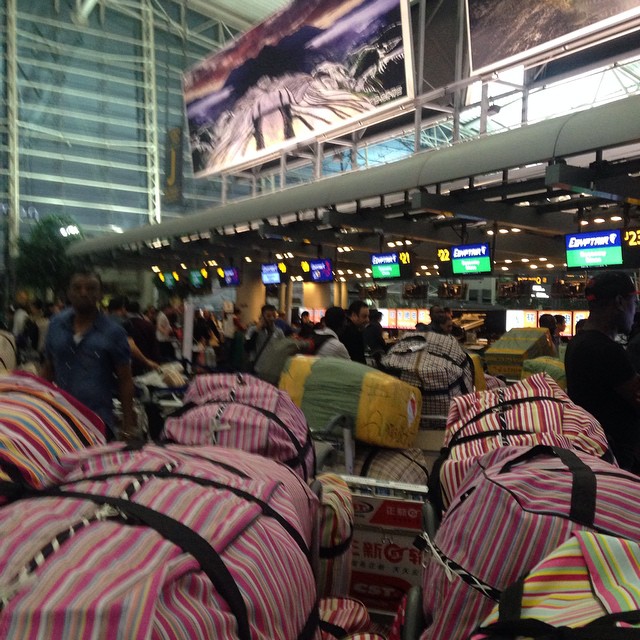After reading my blog, A Chinese friend goes to Africa, Swift asks me if I could write about her experiences in Togo. On one hand, I think she wants others to know about a particular instance of Chinese doing business in an African context, which has been wrought with challenges. Before her first trip to an African country in late March 2015, Swift thought she knew everything there is to know about Africans because she has been doing business with them for five to seven years. Once in Togo, she realized that there’s more to learn about African people, especially how history has shaped attitudes towards and views of someone who looks like her (i.e., Chinese). On the other hand, I think she wants to correct my conclusion in the above mentioned blog. Apparently, the kindness shown by the Togolese customer-turned-friend, who I shall refer to by her market name, Anna, was short-lived once Swift broached the subject about business and money.
Swift’s Chinese business partner had given her the unpleasant task of finding out from Anna where his money has disappeared to. She, however, doesn’t want me to begin the story at that point, but insists that I start the story about her time in Africa from the beginning, before she found herself fearful for her life and locking her bedroom door at night. But, let me quickly mention here that except for the new stocks that arrived in December Anna had sold everything that Swift’s business partner in Guangzhou had sent to Togo since July 2015. In a period of five months (July-December 2015), the amount of money that Anna sent to China did not add up to the costs of the stocks that were shipped to her and had ruffled feathers at the market in Lome by underselling all the jewelry traders. The extent of the latter shouldn’t be underestimated because these traders can no longer sell the same jewelries that they’ve purchased from Swift’s business partner in Guangzhou. According to Swift, these traders are out for blood, wanting to know who’s the real boss of the shop that Anna’s been selling from. Technically, the shop is hers although it’s backed by entrepreneurs based in China. But, she has been trying to direct everyone’s attention onto Swift, letting other Togolese believe that it’s a “China shop.”
I agreed to Swift’s appeal for several reasons other than that she’s my friend: one, except for attending a conference in Accra, Ghana in 2015, I’ve yet to spend time in West Africa. Although most of Africa has been colonized by European powers and I can speak (write) broadly about that history and its impact on the continent and people, each country still has different histories and practices, so I cannot generalize what I know about South Africans to Togolese. Two, Swift’s story seems to counter some academic studies and most journalistic reports that suggest “the Chinese” are taking advantage of Africans by dumping cheap China-made goods into their markets. The flip side of this view is Africans are victims or passive actors. Swift’s story is as much about an African woman’s attempt to benefit from her business contacts in China as it is about a group of Chinese business partners seeking a way to enter Africa’s markets. Both sides have to think quickly to try to gain or maintain the upper hand. Three, Swift’s experiences largely involve two businesswomen, one African and one Chinese, although there are other actors who might have more capital or influence. The interactions and strategies to “beat” (a word Swift had used in our WeChat communication) the other are carried out on the ground by these two women. While there is conviviality between them, there is no sense of cooperation. Swift wrote to me, “Woman is the most dangerous thing in the world. I am always afraid of women.” The experiences my friend has had in Togo tell a story about gender dynamics in relations between Africans and Chinese (or South-South relations) that have yet been explored in the available academic literature.

- Women of the “Global South”
As already pointed out in the earlier blog mentioned above, Swift has been struggling to sustain her wholesale business in Guangzhou: in her view, 2015 was a really bad year compared to others. To try to improve her situation, she entered a business partnership with a long-time friend (referred to hereafter as YC) and a manufacturer (Mr H), who has been providing YC with stocks of jewelry for his wholesale business until recently. With 26,000RMB, she bought herself a (30 per cent) share of the business that would entail travel to Togo. She would stay in Lome, the country’s capital, to set up the business venture with Anna; and Anna had agreed that Swift could stay with her while she’s in the country. Being that Togo is a neighbor of Ghana, Swift didn’t mind being designated to travel to and stay in Africa. She could use the opportunity to follow up with customers from Accra, the capital of Ghana, she thought. She applied for a visa to Ghana and met with customers in Accra first before she headed to Togo (I will write about her border crossing experience in another blog).

- Airport check-in






Waiting for the following parts
LikeLiked by 1 person
Definitely!
LikeLike